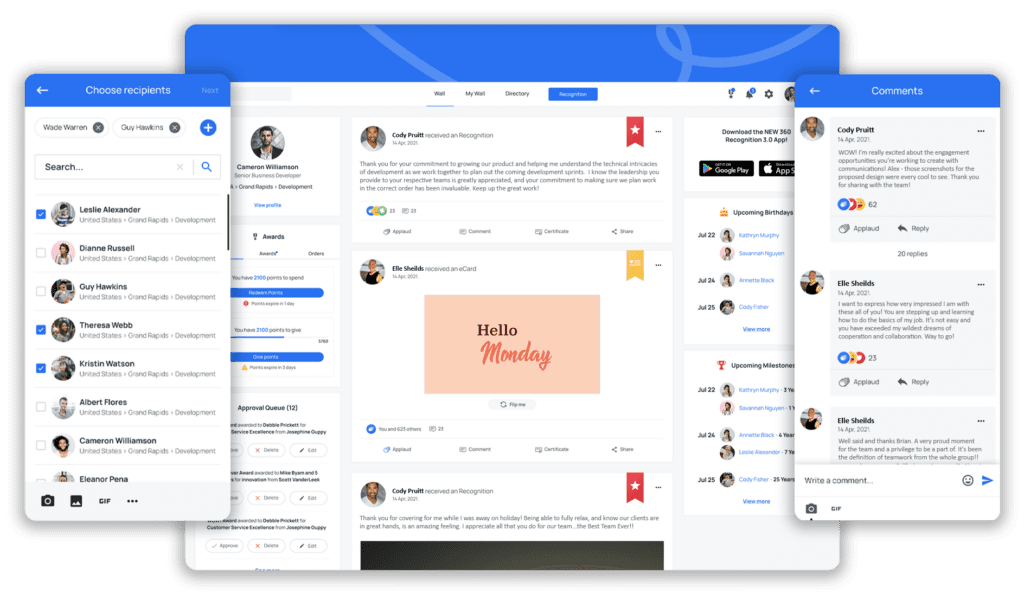February 28, 2024


When it comes to employees, some don't hesitate to go above and beyond - they jump in and tackle challenges head-on. Others, on the other hand, prefer to stay in their lane and do what's asked of them.
While there may not be anything wrong with the latter, most leaders would prefer a team that goes above and beyond. But what makes some people reach for more while others sit back?
There are many factors at play, but it all ultimately comes down to employee empowerment.
When employees feel empowered, they're more likely to take on challenges, offer innovative ideas, and contribute their best work. Here, we'll explore what employee empowerment means, some factors of empowerment, and how to empower your teams.
What is Employee Empowerment
Employee empowerment is a facet of employee engagement that refers to the delegation of power and authority to employees, giving them a certain level of autonomy and decision-making capabilities within their roles and responsibilities.
It involves providing employees with the resources, information, skills, and authority necessary to make decisions that affect their work and the organization's outcomes.
Key aspects of employee empowerment include:
Autonomy: Employees are given the freedom to make decisions within their areas of responsibility without constant supervision.
Authority: They are provided with the necessary authority to implement decisions and take actions that contribute to organizational goals.
Access to Information: Employees have access to relevant information, enabling them to make informed decisions.
Skills Development: Empowered employees are equipped with the skills and knowledge needed to perform their roles effectively.
Responsibility and Accountability: Along with empowerment comes accountability for the outcomes of their decisions and actions.
Supportive Environment: A supportive work culture encourages and facilitates employee empowerment by valuing their input and contributions.


Benefits of Employee Empowerment
Employee empowerment offers numerous benefits to both employees and organizations. Some of the key benefits include:
Increased Job Satisfaction: Empowered employees feel more valued and engaged in their work, leading to higher job satisfaction levels.
Enhanced Motivation and Morale: When employees have autonomy and authority over their work, they are more motivated to perform well and take pride in their contributions.
Improved Problem-Solving and Decision-Making: Empowered employees are better equipped to handle challenges and make decisions in their areas of responsibility, leading to quicker and more effective problem-solving.
Higher Levels of Innovation and Creativity: Empowering employees encourages them to think critically and explore new ideas, leading to innovative solutions and processes.
Increased Productivity: When employees feel empowered, they are more likely to take initiative and ownership of their tasks, resulting in boosted productivity and efficiency.


Better Employee Retention: Organizations that empower their employees tend to have lower turnover rates as employees feel valued and are more likely to stay with the company.
Fostered Continuous Learning and Development: Empowerment encourages employees to expand their skills and knowledge to better fulfill their roles, leading to continuous learning and talent development.
Enhanced Customer Satisfaction: Employees who are empowered are better positioned to meet customer needs and provide excellent service, leading to increased customer satisfaction and loyalty.
Adaptability and Agility: When employees are empowered, they're more adaptable to change and can quickly adjust to new situations or challenges, helping organizations stay competitive in a rapidly changing environment.
Improved Organizational Performance: Overall, empowering employees leads to improved organizational performance by leveraging the diverse talents and perspectives of employees, fostering a positive work environment and a culture of innovation, and driving continuous improvement.
RELATED: Cultural Diversity in The Workplace: What it is, Why it’s Important, and How to Get Started


How to Improve Employee Empowerment
At the heart of employee empowerment is mutual trust - from both employee and employer. Employers need to trust that their employees have valuable contributions and employees need to trust that their contributions will be considered and implemented.
To build that trust into your empowerment strategy, there are a few key factors that will help empower employees.
1. Listen to Employee Feedback
Many companies today utilize an employee survey program, like employee engagement or pulse surveys. While this is a great first step, the key to improving employee empowerment is asking for employee feedback and then putting that feedback into practice.
When companies send surveys and they don't act on employee feedback, not only do they risk empowering employees, but they also risk survey fatigue. Meaning, that employees begin to feel as if their opinions don't matter, so they stop actively participating in surveys.
Avoid this by encouraging employees to give their honest feedback in surveys and then follow up. Whether it's in a company-wide meeting or through other communication channels, show what feedback you received and what you plan to do with it.


2. Professional growth
Another great way to support employees is through professional development and training programs. Depending on your organization's goals, you'll likely have individual employees who you can invest back into that will help both the employee and the organization.
In fact, a study by Bridge by Instructure found that 70% of employees say job-related training and talent development opportunities influence their decision to stay at their current job.
So, encourage investment in learning and development by fostering a company culture where employees actively share their expertise, embrace new challenges, and participate in industry conferences or events to enhance their skills. HR should also create transparent career advancement pathways within the company.
Additionally, to ensure opportunities for professional growth are embedded into your company culture, encourage coaching and mentorship programs. This allows employees to learn new skills on a daily basis, in addition to more formal training opportunities.
3. Recognize and Reward Employees
Positive reinforcement can be a powerful tool for shaping behavior. So when an employee takes the initiative to go the extra mile, rewarding them for doing so is critical. This not only makes employees feel appreciated, but it empowers employees to repeat the same type of behavior in the future.
So much so, research has found that when employees believe they’ll be recognized for their work, they’re nearly three times more likely to be highly engaged. And when employees are highly engaged, they're more likely to be empowered.
Employee recognition programs come in various forms, tailored to suit the needs and preferences of different organizations. Here are some common types of employee recognition programs:
- Peer Recognition Programs: Peer recognition programs involve employees recognizing and appreciating their colleagues' contributions, typically through an employee recognition software platform. These platforms can offer:
- Spot Awards/Recognition: Spot awards are given on the spot to employees for demonstrating exceptional performance, going above and beyond their duties, or achieving specific goals. These awards are typically immediate and can be in the form of points, certificates, or other tangible rewards.
-
- Non-Monetary Recognition: Social recognition platforms, like Terryberry's Be Recognized, can sync up with a points program. This can allow users to send recognition with or without points, which the recipient can then redeem for an employee reward of their choice.


- Service and Milestone Awards: Service awards recognize employees for their long-term dedication and commitment to the organization. These awards are often given at significant anniversaries, such as 5, 10, or 20 years of service, and can include plaques, custom jewelry, or other commemorative items. Milestone awards, on the other hand, are given for a wider range of achievements - like completing a major project, reaching a tough goal, or an employee of the month program.
- Wellness Programs: Recognition programs can also focus on promoting employee physical and mental wellness. This can include activity or step challenges, workshops, and health screenings. Employees can then win prizes for participating in or winning certain initiatives.
4. Delegate
When leaders delegate tasks, it demonstrates that they trust their team. This trust allows for greater autonomy, and autonomy leads to true empowerment. When a team member has the authority to make a decision, they feel empowered. However, if the decisions they make end up getting reversed by their manager, that empowerment weakens.
So, leaders need to make sure that employees have had the proper training and are knowledgeable enough to make strong decisions before they're given authority. The more control people have over their work and how it is done, the higher their sense of empowerment.
RELATED: Diversity Culture: How to Bring Psychological Safety to the Workplace
Conclusion
When employees are empowered, they contribute to increased productivity, retention, and morale. However, it is important to lay the groundwork for employees to become empowered, like investing in their skill development, listening to feedback, recognizing employees, and, finally, trusting them.
Getting Started with Terryberry
Ready to get started improving employee empowerment with a recognition or wellness program? Terryberry's Be Recognized employee recognition software allows you to create an engaged, purpose-led organization through employee recognition, corporate wellness, custom awards, and analytics.
Our platform is designed to facilitate social recognition from both peers and managers. As employees earn points, they can exchange them for a reward of their choosing, including material goods from thousands of top brands and custom company SWAG. We also offer custom awards and jewelry to celebrate employee milestones.
Employee recognition programs are one of the cornerstones of a healthy work environment where employee empowerment and engagement drive success.
If you're thinking about implementing a strategy to recognize employees, schedule a demo with our team to see how Terryberry can transform employee engagement at your company.





